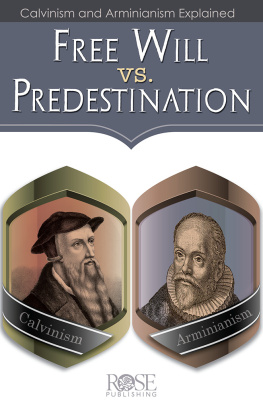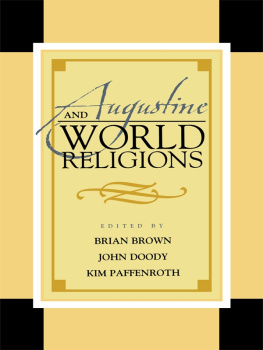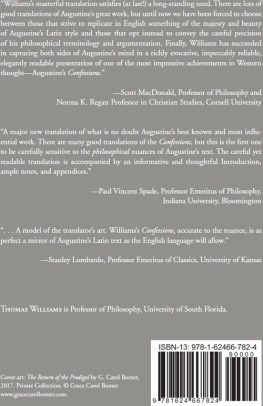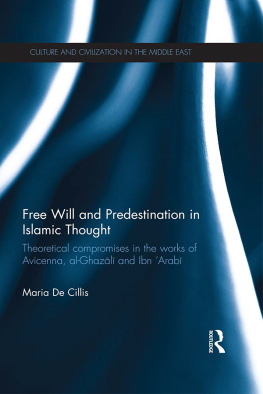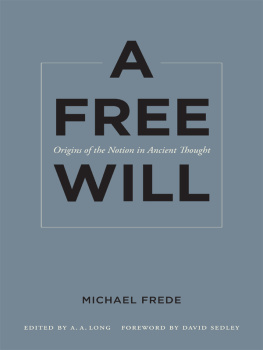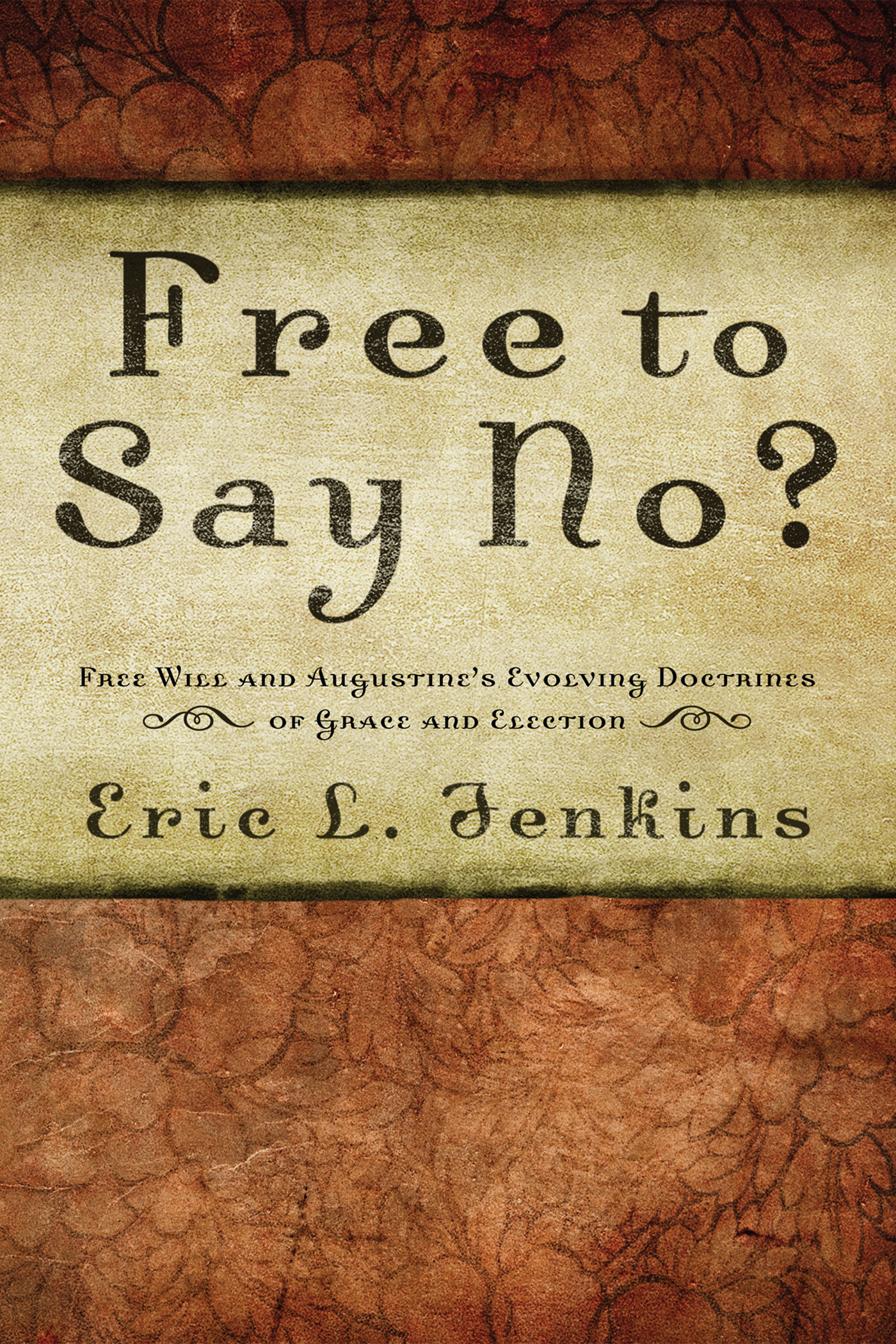I would like to express my deepest love and appreciation to my wife, Jacquelin, whose love and patience allowed me to focus so much time and energy on the completion of this book. Her listening ear and insightful comments and questions helped me to clarify my thoughts and develop my conclusions in a more coherent manner. This project would not have been possible without her support.
I would also like to acknowledge the loving patience of my three precious children: Joshua, Sheila Joy, and Jeremie. They were forced to listen to far too many dinner time discussions of Augustine, grace, free will, and other topics, yet they never complained and frequently asked thoughtful questions. Showing them all the love and attention they deserved, while delving into the voluminous writings of Augustine and his interpreters, was a task I may not have done as well as I would have liked, but their love and support always remained consistent.
Finally I would like to acknowledge the assistance of Tony Lane, professor at London School of Theology. The conclusions of this book are not his, but his gentle interrogations helped me fill in my logic flaws, strengthen my arguments, and limit my polemical tendencies.
Introduction
A n enormous earthquake rocked North Africa at the end of the fourth century and its repercussions continue to be felt throughout the world today. The epicenter of the quake was an unlikely place, the quiet study of a newly appointed priest named Aurelius Augustine, in the city of Hippo. The first rumbles began around 396, as Augustine wrestled with the biblical teachings of grace, election, and the freedom of the will. His conclusions sent tremors through monasteries from North Africa to France and influenced the development of religious, philosophical, psychological, and even political thought for the next 1600 years. Henry Chadwick, noted historian of the early church, credits him with influencing Anselm, Aquinas, Calvin, Luther, Pascal, Kierkegaard, and Nietzsche. He claims Augustines psychological analysis even anticipated parts of Freud. Many scholars believe Augustine shaped Western theology like no other person in church history, since the apostle Paul. His ideas were important in the foundation of the Catholic Church, but they also inspired the great Reformers. Many of the issues that are still being hotly debated in the church today find their roots in the varying interpretations of the teaching of Augustine.
None of those issues have stirred up more debate over the centuries than his doctrines of grace, election, and free will. Was mans destiny preordained by Gods elective decrees before the foundation of the world, or is he the captain of his own ship? Does God love all of his creation or only the elect? Do we have limited autonomy or are we so dependent on him that we cannot do anything good unless his grace causes us to do it? Are we puppets, with God pulling our strings, or is it possible that even God himself doesnt know for sure what is going to happen next? These are just a few of the questions that emerge from a study of Augustines writings.
Despite his enormous influence on Western Christianity, most Christians, including most pastors and church leaders, know very little about what he wrote. One reason for this deficit is the vast amount of writing attributed to Augustine. He was a prolific author and the sheer volume of his writings has been compared to a theological Swiss Alps. Since it would take many books to study all the topics he covered, this book will focus on his doctrines of grace and election, with particular interest in their relationship to his theory of free will. Most scholars readily agree that Augustines doctrines of election and grace went through major changes as he wrote. Augustine himself confessed to frequent vacillations in his views, saying, I admit that I try to be of the number of those who write by advancing in knowledge, and advance by writing. There is, however, a great deal of disagreement over how these changes affected his theory of free will.
There are at least three different approaches to evaluating Augustines theories of free will. The first approach seeks continuity by interpreting his later predestinarian teaching in light of his early teachings on the freedom of the will. Eugene Portali and Etienne Gilson are two scholars who advocate this approach. Portali denies accusations that Augustine, sacrificed freedom of the will on the altar of divine determinism. This approach argues that Augustines early concept of free will remained consistent to the very end.
The second approach seeks continuity by attempting to harmonize Augustines early and later works with each other. Carol Harrison suggests Augustines early view of the will, never shared the classical ideal of human autonomy and self determination, that some scholars have attributed to it. She denies there was a dramatic break in his later theology.
This brings us to the third approach, where scholars like James Wetzel, John Rist, William Babcock, and J. Patout Burns suggest Augustines later doctrines of grace and election call into question his early theory of free will. Wetzel argues that TeSelle and Burnabys attempt to amend Augustines view of grace to make grace resistible is, endeavoring to do surgery with a meat ax. Little of Augustines thought after 396 would survive the operation.
The varied approaches of these Augustinian scholars reveal to us the nature of the debate we are entering. This book proposes that the key issue in this debate is whether or not the human will has freedom to dissent from either the influence of carnal lust or the drawing of Gods grace. Augustines early writings appear to affirm the wills ability to either assent to or dissent from the perceptions, desires and influences which present themselves to it. This will be the most important issue we will explore in this book. Does Augustine allow the will power to say, No to the drawing influence of grace? If he does not, then in what sense does he affirm freedom of the will?
The young Augustine clearly defended freedom of the will against Manichean determinism, but his opponents, who believe his latter theories of grace and election compromised his teachings on the free will, accuse him of renouncing freedom of the will in his later works. Augustine continued to defend free will in his later works, Retractations
We will study Augustines works chronologically in order to understand how developments in his doctrines of grace and election influenced his understanding of the free will, especially its power to say No. This study will include a liberal number of quotes from Augustines works, so that he is allowed to speak for himself. We will, of course, attempt to exegete the meaning of his words to grasp what he is teaching. We will explore the modifications he made along the way, paying particular attention to crucial moments of major change. Finally, we will make some judgments as to whether these varied positions can be reconciled into a consistent theological system or whether they devolve into contradictory theories marked by inconsistency.


